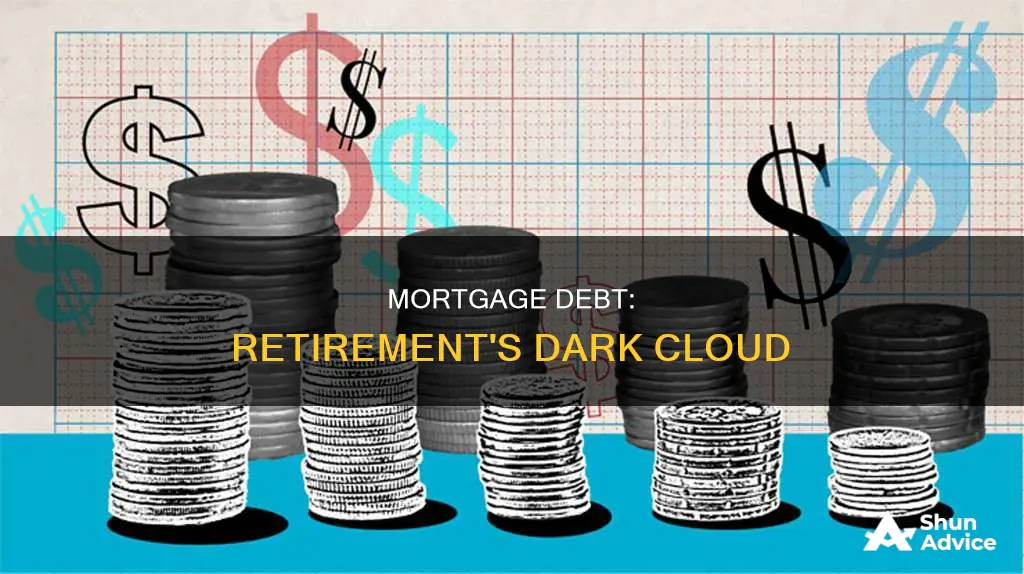
The share of Americans aged 75 and over who are carrying mortgage debt has risen from 5% in 1995 to 25% in 2022, and the average balance of those loans is also increasing. This shift has been attributed to factors such as older homebuyers, low mortgage rates, and refinancing. While a home can be a valuable asset in retirement, it is not easily liquidated to cover daily living costs. This raises the question: is it better to pay off your mortgage before retirement or continue making monthly payments during retirement? The answer depends on various factors, including income, mortgage size, savings, and interest rates. While prepaying a mortgage can provide peace of mind and lower expenses, it may not always be feasible, especially if it leaves limited savings for emergencies. On the other hand, carrying a mortgage into retirement introduces variable investment returns and the burden of debt during retirement.
| Characteristics | Values |
|---|---|
| Percentage of Americans 75 and over carrying mortgage debt | 25% in 2022 |
| Median amount owed by Americans 75 and over | $102,000 in 2022 |
| Percentage of retirement-age homeowners with mortgages | 51% in 2024 |
| Percentage of over-55s with mortgage debt | 11% in 2023 |
| Percentage of 45-54-year-olds with increased debt | 52% in 2023 |
| Percentage of homeowners over 64 with a mortgage | Over 40% in 2025 |
| Average amount owed by individuals with mortgages | Nearly $150,000 |
| Number of housing units with mortgages owned by people 65 and older | Over 10.5 million |
What You'll Learn

The pros and cons of having a mortgage in retirement
The number of retirees with mortgage debt has been increasing over the years. In 2022, 25% of Americans aged 75 and over carried mortgage debt, compared to only 5% in 1995. This shift can be attributed to various factors, including older first-time homebuyers, rising home values, and low mortgage rates. While some retirees may benefit from having a mortgage, others may find it a burden. Here are some pros and cons to consider:
Pros of having a mortgage in retirement:
- Tax benefits: Retirees with a mortgage can take advantage of tax deductions on mortgage interest, which can reduce their overall tax liability. However, it is important to note that tax laws change, and the benefits may vary depending on the specific laws in place during retirement.
- Diversification: Retirees with a mortgage can diversify their investments by using their money for investments instead of paying off the mortgage in full. This can potentially lead to higher returns, especially if the investment returns exceed the mortgage interest rate.
- Consumer debt reduction: If retirees have other consumer debt with higher interest rates, such as credit card debt, it may be more financially prudent to pay off those debts first. By retaining the mortgage, they can focus on reducing their higher-interest obligations.
- Peace of mind: For some, having a mortgage in retirement provides peace of mind, especially if they can comfortably make the monthly payments without sacrificing their standard of living.
- Low mortgage rates: With historically low mortgage rates available, some retirees may have refinanced their mortgages, resulting in lower monthly payments and improved financial flexibility during retirement.
Cons of having a mortgage in retirement:
- Financial burden: Carrying a mortgage into retirement can be a significant financial burden, especially if the retiree's income is limited. A larger mortgage debt may lead to postponing retirement, reducing spending, or selling the home earlier than planned.
- Impact on retirement age: Retirees with mortgage debt may need to delay retirement to ensure they have sufficient funds to cover their mortgage payments. This can affect their overall retirement plans and quality of life.
- Standard of living: If the mortgage payments are substantial, retirees may need to sacrifice their standard of living to make the monthly payments. This could result in reduced spending on leisure activities, healthcare, or other essential expenses.
- Limited liquidity: While a home is an asset, it is not a liquid asset. Homeowners cannot easily access the equity in their homes to cover daily expenses or unexpected costs. This lack of liquidity can be a challenge during retirement when stable income sources may be limited.
- Impact on savings: Retirees who make monthly mortgage payments may have reduced savings for emergencies or unexpected costs. This can lead to financial instability and increased vulnerability to economic shocks.
Mortgage Rates: What's Behind the Recent Rise?
You may want to see also

The rise in retirees with mortgage debt
The share of Americans aged 75 and over carrying mortgage debt has risen from 5% in 1995 to 25% in 2022, according to the federal Survey of Consumer Finances. This shift can be attributed to various factors, including older first-time homebuyers, the appeal of low-interest rates, and the comfort of the baby boomer generation with carrying mortgage debt into retirement.
Traditionally, Americans aimed to pay off their mortgages by the time they retired, but this trend is changing. The share of retirement-age homeowners with mortgages has increased from 38% to 51% in about 25 years, according to a Michigan study. This shift is also reflected in the findings of Harvard University, where a study revealed that 46% of homeowners aged 65 to 79 carried a mortgage in 2016, compared to 24% in 1990.
The rise in mortgage debt among retirees can be attributed to several factors. Firstly, the typical first-time homebuyer was 35 in 2023, and the average repeat buyer was 58, indicating that homebuyers are getting older. Secondly, millions of Americans refinanced their mortgages in recent years to take advantage of historically low-interest rates, which can extend the length of the mortgage. Additionally, baby boomers, born between 1946 and 1965, are more comfortable than previous generations with carrying mortgage debt into retirement.
The increase in mortgage debt among retirees has led to varying financial outcomes. On the one hand, home values have risen, resulting in higher wealth accumulation for retirees. On the other hand, researchers have found that retirees with larger mortgages tend to delay retirement, spend less during retirement, and sell their homes sooner. Additionally, certain demographic groups, such as Black and Hispanic households, face a particularly challenging situation due to limited financial assets.
The decision to carry mortgage debt into retirement depends on various factors, including income, mortgage size, savings, and interest rates. While some retirees may benefit from the tax deductions associated with mortgage interest, others may prefer the peace of mind that comes with owning their home outright. Ultimately, the rise in retirees with mortgage debt underscores the importance of careful financial planning to ensure a secure and comfortable retirement.
Foreclosure Proceeds: Multiple Mortgages, How to Distribute Funds?
You may want to see also

The financial impact of mortgage debt in retirement
Financial implications
The financial implications of mortgage debt in retirement can be complex and depend on various factors, such as income, mortgage size, savings, and interest rates. Retirees with larger mortgages tend to face greater financial challenges, including postponing retirement, reduced spending, and selling their homes earlier. Additionally, Blacks and Hispanics with mortgage debt face a particularly stark retirement, with median financial assets close to zero.
Strategies for managing mortgage debt in retirement
There are several strategies that individuals can consider to manage mortgage debt in retirement:
- Prepaying the mortgage before retirement if income allows and there is no prepayment penalty, especially if it provides peace of mind and lowers monthly expenses.
- Downsizing to a smaller home to eliminate mortgage debt and free up equity.
- Continuing to make monthly mortgage payments if done comfortably and taking advantage of interest tax deductions.
- Focusing on eliminating higher-interest debt first, such as credit cards and personal loans, as mortgage debt typically has lower interest rates.
- Reinvesting home equity to create an additional income stream during retirement.
- Diversifying investment portfolios to potentially achieve higher returns than residential real estate over the long term.
Unpaid Collections: Impact on Mortgage Approval and Your Future
You may want to see also

Strategies for managing mortgage debt in retirement
The number of retirees with mortgage debt has been steadily increasing over the years. In 2022, 25% of Americans aged 75 and over carried mortgage debt, compared to only 5% in 1995. This shift has led to a growing need for strategies to manage mortgage debt in retirement effectively. Here are some approaches to consider:
Financial Planning and Budgeting
- Consult a financial advisor or mortgage broker: Engaging professionals can provide tailored advice based on your financial situation. They can guide you through debt repayment, refinancing, and investment strategies, helping you make informed decisions.
- Create a sustainable retirement income plan: Balance your income needs with investment growth to maintain long-term financial security. Consider seeking advice from services that offer retirement income planning assistance.
- Debt management: Explore strategies for managing and reducing debt, including mortgage debt, to improve your overall financial stability in retirement.
- Credit counselling: Consider seeking help from nonprofit credit counselling agencies. They can offer budgeting advice, money management techniques, and debt management plans to help you better navigate your financial situation.
Refinancing and Downsizing
- Refinancing: Evaluate the option of refinancing your mortgage to take advantage of lower interest rates. However, be cautious as refinancing usually extends the loan term, which may increase the total interest paid over time.
- Downsizing: Consider selling your current home and using the profit to buy a smaller, more affordable home. This approach can potentially leave you mortgage-free, but carefully evaluate the associated costs and the value of your current and prospective homes.
Alternative Loan Options
- Home equity loan: Consider tapping into your home equity through a loan or a reverse mortgage. This approach can provide additional income or supplement your retirement income, but be mindful of the potential impact on your equity and overall financial situation.
- Personal loans: Explore alternative loan options with more favourable interest rates. Consolidating debt with a personal loan can simplify your payments and help you manage higher-interest debt more effectively.
- Loans from friends or family: Borrowing from loved ones can be an option, but clearly communicate and document the repayment terms to maintain healthy relationships.
Estate Planning
- Open communication with beneficiaries: Discuss your estate plan and any outstanding mortgage debt with your heirs. Being transparent about your strategies for covering debts can help manage expectations and prevent misunderstandings.
- Life insurance: Consider purchasing life insurance to provide funds to pay off the remaining mortgage balance upon your passing. This ensures that your estate can cover outstanding debts, minimising the impact on the inheritance left to your beneficiaries.
Remember, the key to managing mortgage debt in retirement is ensuring affordability without sacrificing your standard of living. It is essential to weigh the pros and cons of each strategy and seek professional advice to make informed decisions that align with your financial goals and retirement plans.
Rolling Closing Costs into Your Mortgage: A Good Idea?
You may want to see also

The emotional impact of mortgage debt in retirement
Historically, most Americans aimed to pay off their mortgages before retirement, and it was seen as a rite of passage for those approaching retirement age. However, this trend has changed in recent years, with a growing number of retirees carrying mortgage debt. This shift has been attributed to various factors, including older first-time homebuyers, lower mortgage rates, and the increasing value of homes.
The emotional impact of carrying mortgage debt into retirement can be complex and vary depending on individual circumstances. On the one hand, the stress of making monthly mortgage payments during retirement can be a significant burden, especially if it affects the retiree's standard of living or ability to cover unexpected costs. In such cases, the weight of debt can lead to increased financial worries, anxiety, and a sense of insecurity about the future.
On the other hand, for some retirees, the emotional impact of mortgage debt may be more positive. Some individuals may feel a sense of comfort and peace of mind in continuing to make monthly payments if they can do so comfortably and benefit from interest tax deductions. Additionally, for those with low-interest mortgages, paying off the debt may not be a priority, especially if it means sacrificing their savings or retirement accounts, which could impact their financial stability in the long run.
Furthermore, cultural and societal norms can also influence the emotional impact of mortgage debt in retirement. In previous generations, owning a home outright before retirement was considered an achievement and a sign of financial stability. However, with the changing landscape of homeownership and retirement planning, these norms are shifting. Retirees may feel a sense of relief and pride in owning a home, even with a mortgage, as it provides them with a sense of security and a valuable asset.
While the emotional impact of mortgage debt in retirement can vary, it is essential to consider the financial implications and make informed decisions. Seeking professional advice and carefully evaluating one's financial situation can help retirees make the right choices for their emotional and financial well-being.
The Intricacies of Mortgage Funding: Where Does the Money Come From?
You may want to see also
Frequently asked questions
A recent Harvard University study found that 46% of homeowners between the ages of 65 and 79 carried a mortgage in 2016, compared to 24% in 1990. The share of Americans aged 75 and over carrying mortgage debt has risen from 5% in 1995 to 25% in 2022.
Homebuyers are getting older. The typical first-time buyer was 35 in 2023, and the average repeat buyer was 58. Baby boomers are also more comfortable than previous generations with taking on mortgage debt later in life. Many have refinanced their mortgages in recent years, taking advantage of historically low rates.
It depends on the individual's financial situation. Generally, it is preferable to clear mortgage debt before retirement to reduce monthly expenses and free up cash flow. However, in some cases, it may make sense to carry mortgage debt into retirement, especially if the interest rate is low and the individual can benefit from tax deductions.







